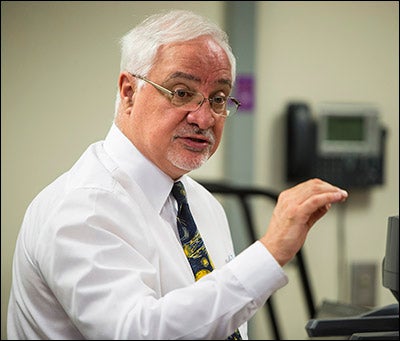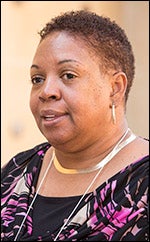‘CREAM OF THE CROP’
ECU program grows media coordinators for underserved communities
Thirty students, many of whom already teach in economically disadvantaged North Carolina communities, have enrolled in an East Carolina University master’s program to become media coordinators in underserved schools.
In April, the library science degree program in the College of Education at ECU received nearly $500,000 through a 2014 Laura Bush 21st Century Librarian Grant from the Institute of Museum and Library Services. ECU will provide $165,045 in non-federal matching funds, bringing the total to $657,369
 The grant funding pays full tuition, university fees and a book stipend for each of the graduate students in the online program. Membership in the North Carolina School Library Media Association and a travel stipend to attend an association conference also will be included.
The grant funding pays full tuition, university fees and a book stipend for each of the graduate students in the online program. Membership in the North Carolina School Library Media Association and a travel stipend to attend an association conference also will be included.
“You’re the cream of the crop,” said Dr. John Harer, master of library science degree coordinator and associate professor of library science in the College of Education, who welcomed students Aug. 15 in Joyner Library. There were 150 applications for 30 spots.
One of the new students is Beverly Hines, who supervised a dye lab for a New Bern factory for 20 years before the mill closed in 2007.
Hines had attended college in the 1980s but was unable to finish. With the loss of her job, she returned to school and graduated with an elementary education degree from ECU in 2010. “I’m 50, so I had to retrain and start all over,” Hines said. “My age let me have a new perspective.”
Hines teaches fourth grade at Comfort Elementary School in Jones County, where she grew up. The library science program is a great opportunity, she said. “It was something I really wanted to do,” said Hines, who eventually would like to be a media coordinator in Jones County.
The program will use a “grow your own” model, focusing on students who want to stay and work in North Carolina, officials said.
“This project will increase the number of trained, professional media specialists that reflect the diversity of their communities and increase the ability to connect with those diverse populations,” Harer said.

Beverly Hines
Helping children learn to read is a top priority in North Carolina and around the country, said Dr. Linda Patriarca, dean of the College of Education. ECU’s graduates will enhance and expand literacy opportunities for kids. “That’s what it’s all about,” she said.
Dr. Vivian Mott, interim chair of interdisciplinary professions in the College of Education, told the students that she pretended to be a librarian as a child. Mott’s great uncle drove the county bookmobile, and sometimes he would let her ride on his route.
“You are at a university that understands what it means to be a beacon for the east,” said Mott, describing ECU’s motto of service and dedication to outreach in the region. “We take our mission to heart.”
ECU’s master of library science degree program, established in 1939, is the largest producer of school library media coordinator graduates in the state. The online program supports non-traditional students seeking employment as librarians and information professionals in primary, middle and high schools, universities, community colleges and public libraries.
The Institute of Museum and Library Services awarded 23 grants out of 82 proposals received from across the country. Only two North Carolina institutions, ECU and the University of North Carolina at Chapel Hill, received grants.